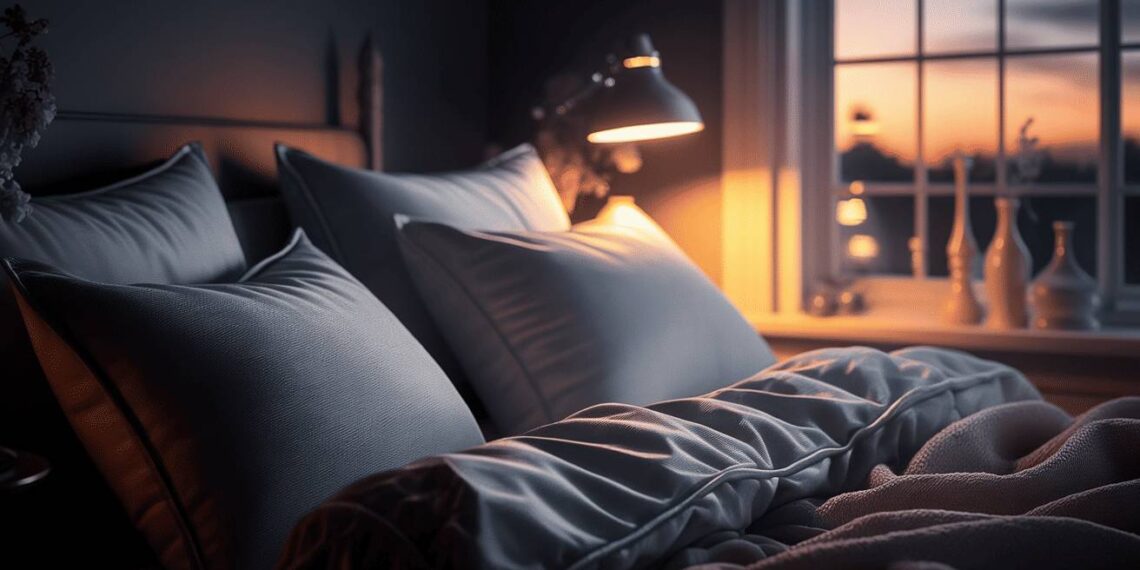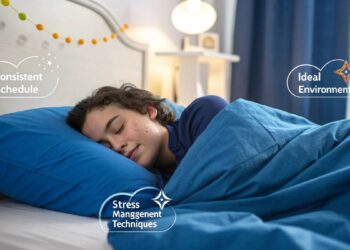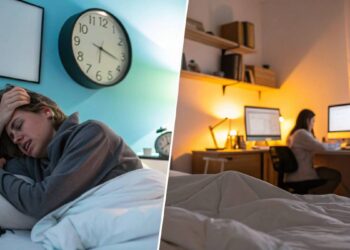In our fast-paced modern lives, sleep often becomes an afterthought rather than a priority. Yet, every night of quality rest is key to unlocking your brain’s full potential, balancing emotions, and energizing your body. Imagine waking up refreshed, ready to conquer challenges with enhanced memory, sharper focus, and a calmer mind. This article dives deep into the science of sleep, revealing how better rest transforms productivity, mood, and overall health. Discover practical tips on creating a sleep haven, establishing a consistent routine, and embracing technology for smarter sleep habits—all to empower you to reclaim your nights. Now start transforming tonight.
Key Takeaways
- Sleep Deprivation Effects: Memory loss, mood swings, reduced focus, and higher risk for chronic health issues.
- Benefits of Quality Sleep: Improved cognition, balanced emotions, robust immune system, and increased productivity.
- Creating a Sleep-Friendly Environment: Ideal temperature, darkness, minimal noise, and comfortable bedding.
- Consistent Sleep Routine: Same bedtime and wake-up times, calm pre-sleep rituals, and controlled napping.
- Stress Management & CBT-I: Techniques such as mindfulness, deep breathing, and structured cognitive therapy.
- Role of Technology and Lifestyle: Gadgets for sleep tracking, exercise, and diet adjustments to support sleep.
Understanding Why Sleep is So Important
What Happens with Lousy Sleep
When you skimp on sleep, life can go a bit haywire. Lack of shut-eye can scramble your brain, twist your emotions, and even mess with your health. Here’s what might happen:
- Your memory takes a nosedive and your brain feels like it’s wading through sticky syrup.
- Zoning out at work or school? Yep, that’s from not sleeping enough.
- Grumpiness and snapping at folks? Blame it on being too tired.
- Your clumsiness spikes, making accidental injuries more likely.
- Your body’s defenses weaken, so you catch every cold out there.
- Long-term sleep deprivation could invite big hitters like heart disease, diabetes, and even weight gain to the party.
| What Goes Wrong | Why It’s Bad |
|---|---|
| Brain power | Can’t remember stuff |
| Getting things done | Hard to focus and finish tasks |
| Mood swings | Grumpy, maybe angry |
| Health issues | Heart troubles, blood sugar wonkiness |
| Immune system | Sick more often |
Realizing these consequences helps understand why it might be wise to peek at our efforts to sleep better.
Perks of Good Sleep Habits
Being a bedtime pro has its perks, making life’s hustle a bit smoother. Here’s what’s in store:
- Brain gets a boost: Enough sleep sharpens memory, sparks creativity, and makes you a whiz at solving puzzles.
- Mood’s on an even keel: With the right rest, you’re less likely to feel blue or wound up.
- Body’s happy: Sleep strengthens your defense system, and keeps those long-term health hiccups at bay.
- More gets done: Well-rested? You focus better and plow through tasks quicker.
- Easier to stay in shape: Sleep helps control the hormones that drive your hunger.
| Perk | What It Does |
|---|---|
| Brain bonus | Better memory and problem-solving |
| Steady moods | Fewer blues and nerves |
| Robust body | Immune system’s on point |
| More productive | Work done faster, better |
| Weight savvy | Keeps cravings in check |
For extra info on reaping these rewards, check out our read on better sleep habits and sleep tips.
By tuning into why good sleep matters, you can step up and weave sleep-enhancing habits into your day-to-day, boosting your all-round well-being.
Setting the Stage for Better Sleep
Making your sleep space cozy and sticking to a bedtime groove can change how well you snooze. By getting these things right, folks can turn their rooms into dreamy havens and find a rhythm that makes them sleep like babies.
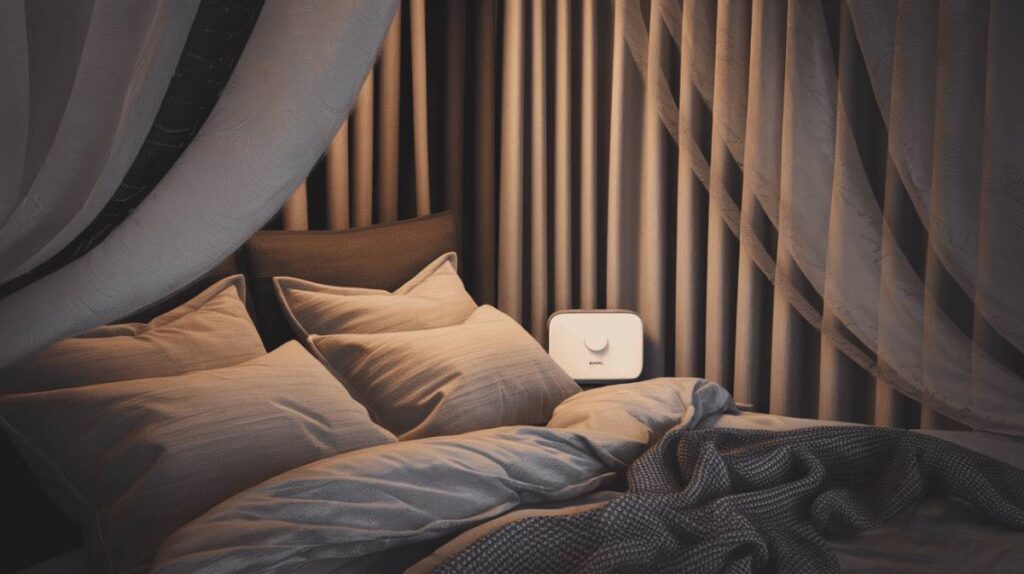
Creating a Sleep-Friendly Environment
Where you sleep can make or break your snooze fest. Think about it—things like room chilliness, how much light’s sneaking in, annoying sounds, and if your bed feels like a cloud or a rock.
“Transform your sleep space into a sanctuary; the right environment is the first step to a restful night.”
Get Your Room Just Right:
- Temperature: Keep it on the cool side, somewhere between 60-67°F (15-19°C) is golden.
- Lighting: Shut out the light with blackout curtains. Start dimming things down about an hour before bed.
- Noise: Get a white noise machine or some earplugs. A fan can double as a noise masker too.
- Bedding: Your bed should make you wanna dive in! Get a mattress and pillows that have your back—literally.
| Environmental Factor | Ideal Condition |
|---|---|
| Temperature | 60-67°F (15-19°C) |
| Lighting | As dark as you can make it |
| Noise | Keep it hush-hush |
| Bedding | Cozy and supportive |
Got sleeping woes? Learn more to snooze like a pro in our sleep hygiene tips article.
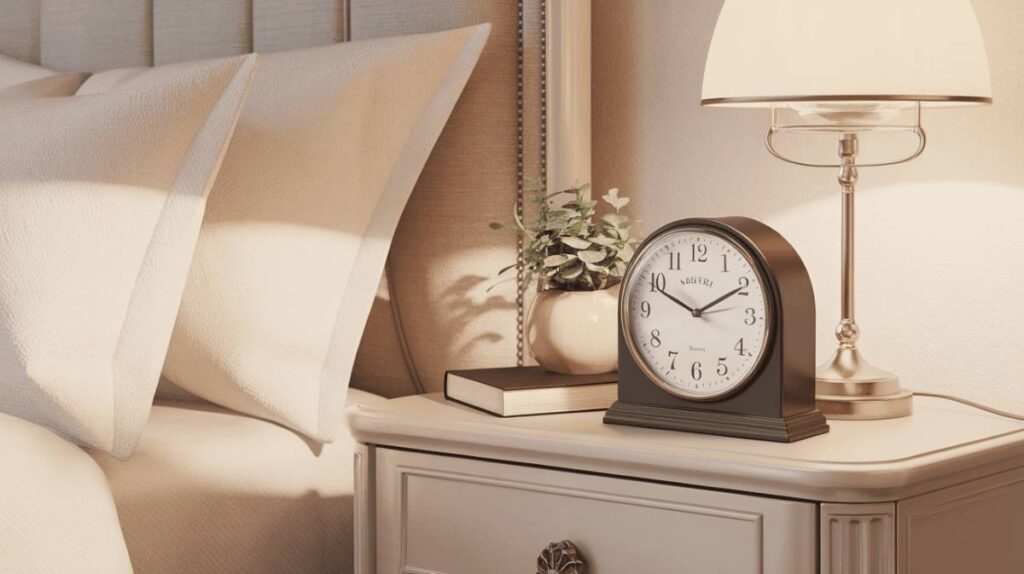
Establishing a Consistent Sleep Schedule
Having a regular sleep schedule is like teaching your body to get its chill on. It keeps your internal clock ticking smoothly so you can hit the sack and rise and shine without drama.
Routine is the heartbeat of quality sleep—when you honor your body’s clock, rest becomes effortless.”
Steps To Craft Your Sleep Groove:
- Pick Your Times: Set a bedtime and wake-up call, and stick with them, even on lazy Sundays.
- Adjust Slowly: If you’re switching things up, don’t rush it. Adjust in little 15-minute chunks.
- Chill-Out Ritual: Make a wind-down playlist of calm activities like reading, soaking in a tub, or getting lost in mellow beats.
- Skip the Naps: Keep naps short, especially later in the day so your night sleep doesn’t get hijacked.
| Schedule Component | Recommendation |
|---|---|
| Bedtime | Same time, every time |
| Wake-up Time | Steady every day |
| Adjustments | Tiny steps (15-minute jumps) |
| Pre-Sleep Routine | Go for calm vibes |
| Napping | Keep it minimal and not too late |
Keeping your sleep routine’s rhythm is the trick to better ZZZ’s. For more scoop on nailing healthy sleep habits, see our article on improving sleep habits.
By setting up a bedroom that whispers ‘rest’ and nailing a sleep pattern that’s right for you, snoozing gets a whole lot better. Click on over to effective sleep improvement strategies for more ways to catch those perfect Zs.
Sleep Strategies That Actually Work
Getting a good night’s sleep can sometimes seem like trying to catch a slippery fish – especially if insomnia’s your nightly buddy, you work whacky hours, or stress has made a home in your mind. But don’t lose hope! There are actually some nifty tricks to up your sleep game.
Chill Out Before Snooze Time
Before you hit the hay, it might be worth taking a chill pill. We’re talking about simple ways to help your brain and body know it’s time to power down. Things like deep breathing, making your muscles go from a tense wire to jello, and imagining you’re on a sunny beach sipping on a piña colada can do wonders.
| Technique | What It’s About | Time You Need (Minutes) |
|---|---|---|
| Deep Breathing | Breathe in like you’re smelling fresh baked cookies through your nose and out like you’re blowing out birthday candles | 5-10 |
| Muscle Relaxation | Squeeze each muscle like you mean it, then relax and let go | 10-15 |
| Visualization | Picture yourself lounging under a palm tree, just chilling | 10-15 |
Wanna know more tricks to kick insomnia to the curb? Check out our sleep improvement guide for the scoop.
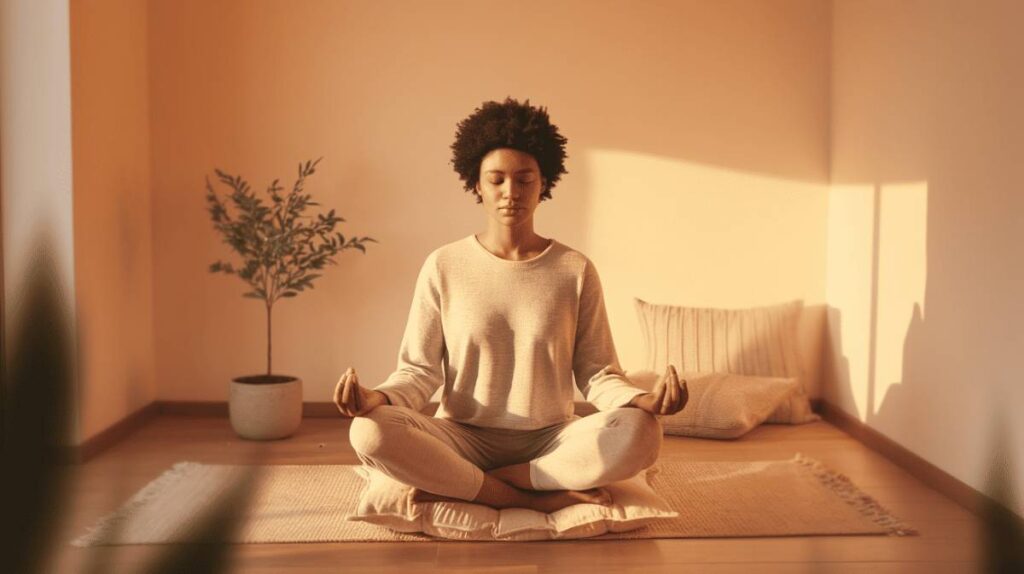
Mindfulness and Meditation: Your New Best Pals
Meditation? Isn’t that the thing monks do? Well, yes. But it’s also a great secret weapon against restless nights. By helping you keep calm and carry on, these methods pave the way to dreamland.
- Mindfulness Meditation: Simply think about RIGHT NOW, and let wandering thoughts do their thing without judgment.
- Guided Meditation: It’s like having a wise guru in your ear, walking you to relaxation town.
- Body Scan Meditation: Mentally roam your whole body, showing special attention to tight spots and encouraging them to relax.
For step-by-step help on using these techniques, peek at our meditative cheatsheet on better sleep.
Follow Your Granny’s Sleep Hygiene Rules
Your grandma knew a thing or two about getting some quality shut-eye. Keeping habits and your boudoir set up correctly help lead you to better Z’s.
- Same Bed-Wake Time Every Day: Train your body with a sleep rhythm, like a metronome for bedtime.
- Ease Up on Screen Time: That blue glow from your gadgets can trick your brain into thinking it’s party time.
- Create a Sleepy Space: Dark, quiet, and cool is the way to go – grab those curtains and earplugs if the world won’t hush.
- Ditch Caffeine and Heavy Din-Dins at Night: Sip a soothing tea or go light with meals before bed for happier sheep counting.
Catch more tips on setting up a sleep-friendly zone with our curated sleep hygiene tips.
So, there you go. By putting these sleep hacks to the test, you’re bound to drift into quality sleep and wake feeling like you could tackle the world. For more dreamy advice, browse through our ultimate sleep guide on improving your snooze time.
Managing Stress and Anxiety for Improved Sleep
Wanna snooze better? Taming stress and anxiety might just do the trick. Let’s unpack some chill-out techniques that could have you counting sheep a little less often, and take a peek into the wonders of Cognitive Behavioral Therapy for Insomnia (CBT-I).
Stress-Relief Strategies
Stress can really mess with your beauty sleep, so it’s key to ease your mind first. Here’s a bunch of stuff that might do the job:
- Breathe Easy: Take slow, deep breaths—like you’re inflating a balloon—calming you down nicely.
- Get Tense, Then Chill: Tense up your muscles, then let ’em relax for a tension-busting effect.
- Mind the Mindfulness: A bit of meditation can shut up that noisy brain of yours. Need a hand? Check out more on mindfulness and meditation for better sleep.
- Jot It Down: Pour out those circling thoughts onto paper—your noggin may thank you.
- Sniff Some Calmness: A whiff of lavender can do wonders for the nerves, letting you snooze more peacefully.
These are like the starter pack for getting better at catching ZZZs.
Cognitive Behavioral Therapy for Insomnia
CBT-I’s kinda like a sleep coach—helping you knock out insomnia by tweaking tricky thoughts and habits. It’s got some nifty bits that can help sleep disturbances become a thing of the past.
Components of CBT-I
| Component | What’s It About |
|---|---|
| Sleep 101 | Getting the low-down on sleep basics and keeping things clean and orderly in your sleep space. Peek at sleep hygiene tips. |
| Mind Games | Spot those unhelpful thoughts, kick ’em out, sleep on! |
| Routine Fixes | Tricks like stimulus control and sleep yoyo (restriction) to sleep more productively. More bedtime hacks here. |
| Chill Skills | Between deep breaths and mindfulness, you’ll lower arousal and up the chill factor. |
| Log the ZZZs | Pen down your sleep pattern tales to weed out sleep villains. |
Benefits of CBT-I
| Benefit | How It Helps |
|---|---|
| Top-Notch Sleep | CBT-I often boosts both how long and how well you sleep. |
| *Speedy Sandlands | Folks tend to drift off quicker after ironing out pesky thoughts and habits. |
| Long-Lasting Results | Forget pills—CBT-I delivers enduring effects without pulling you in. Curious about natural remedies for sleep? |
By giving these stress-busters and CBT-I a whirl, you might just bid farewell to sleep troubles and usher in a well-rested and revitalized you. Got room for more awesome sleep tactics? Look into diverse sleep strategies that sync with your vibe and lifestyle.
Examining Sleep Aids and Supplements
Catching those zzz’s isn’t always a walk in the park, especially if you’re juggling insomnia, late-night work shifts, or stress at work. But hey, sleep aids and supplements might just be your new best friends. Let’s break down the main squads in this game: the natural way and the doctor-approved stash.

Natural Remedies for Sleep
Going natural is like a cozy blanket for your sleep—it’s gentle and gives you those chill vibes without whipping out the medication list. From sipping herbal teas to tinkling essential oils, these go-to’s have got you covered.
| Natural Remedy | What It Is | When You’d Use It |
|---|---|---|
| Chamomile Tea | That warm cup of calm | When you want to unwind at night with a book |
| Lavender Oil | Good-bye stress, hello relaxation | Part of your bedtime wind-down |
| Melatonin | The timekeeper for your body’s snooze button | Adjusting after a flight or work shifts |
| Valerian Root | Nature’s tiny sleep whisperer | For the nights when sleep won’t come easy |
| Magnesium | The chill pill for your muscles | A sprinkle in your after-dinner routine |
Taking the natural route can upgrade your bedtime zen. Just a word to the wise: Check in with your doc before popping any new pills, especially if you’ve already got a bunch of meds on your plate.
Prescription and Over-the-Counter Sleep Aids
When you need something more than a lullaby, prescription and store-bought sleep aids jump in. These guys pack a punch but come with a list of ifs and buts.
| Type | Meet the Sleep Aid | What’s the Deal? |
|---|---|---|
| Antihistamines (OTC) | Makes you drowsy like allergies do | Short-term fix for the sleep deprived |
| Prescription Sleep Meds | Heavy hitters for sleep issues | Only with a thumbs-up from your doc |
| Benzodiazepines | The sleep snugglers | For those sleepless nights that just won’t quit |
| Melatonin Mimers | Copycats of the natural stuff | When your body clock’s out of whack |
Think of these sleep helpers as part of a whole game plan, where sleep hygiene and smart sleep strategies come into play. And hey, your healthcare provider’s got the game map to help find what fits you best.
Poking around the world of sleep aids and supplements can lift the veil on what might kickstart your snooze parade. Whether you’re vibing with the herbal team or the prescription players, the mission is to land on a sleep groove that sticks. Feel free to peek at more sleep boost ideas to dot the i’s and cross the t’s of your dreamland goals.
Lifestyle Tweaks for Better Sleep
The way we live every day has a mighty impact on how well we snooze. Shake things up a little bit, and you might find yourself resting easy and feeling fresh all day.
Move Your Body, Sleep Like a Baby
Getting your heart pumping is one of the best tricks for sweet dreams. Breaking a sweat helps set our internal clocks and boosts the feel-good hormones like melatonin that help us wind down.
When you break a sweat matters, though. Studies show that moderate to high-intensity workouts can help you fall asleep faster and sleep longer. But be careful not to get too riled up before bed—it might just keep you up instead.
| Workout Style | Best Time for It | Sleep Perks |
|---|---|---|
| Cardio (running, cycling) | Morning/Afternoon | Helps you hit the hay faster and snooze deeper |
| Pumping Iron (weight lifting) | Afternoon | Supports those dreamy deep sleep stages |
| Chill Out (yoga, stretching) | Evening | Eases stress, helps you glide into relaxation |
Check out more pointers in our piece on sleep-boosting strategies.
Chow down for Better Sleep
What you munch on can make or break your nap game. Some foods are like a lullaby, while others are a siren of wakefulness.
Sleep-friendly Eats:
- Tryptophan-Laden Grubs: Gobble up turkey, nuts, and seeds for sleepy vibes
- Melatonin Munchies: Nibble on cherries, grapes, and tomatoes for a snooze boost
- Magnesium Morsels: Munch on leafy greens, bananas, and avocados to chill out
| Nutrient | Food | Sleep Superpowers |
|---|---|---|
| Tryptophan | Turkey, Nuts, Seeds | Turns into serotonin and melatonin to ease you to sleep |
| Melatonin | Cherries, Grapes, Tomatoes | Keeps your sleep-wake cycle humming right |
| Magnesium | Leafy Greens, Bananas, Avocados | Calms down muscles and nerves |
Stuff to Skip Before Bed:
- Caffeinated Culprits: Coffee, tea, and choccy can buzz your brain; avoid 6 hours before hitting the sack
- Booze: Might knock you out, but wrecks the natural sleep cycle
- Heavy Chow: Big meals can lead to fitful tossing and turning
For extra foodie tips to sleep better, swing by our guide on IMPROVING SLEEP HABITS.
Little changes can lead to big dreams. With the right workout and a mindful menu, catching Zs becomes a breeze. Dive into more ideas in our compilation of natural sleep boosts.
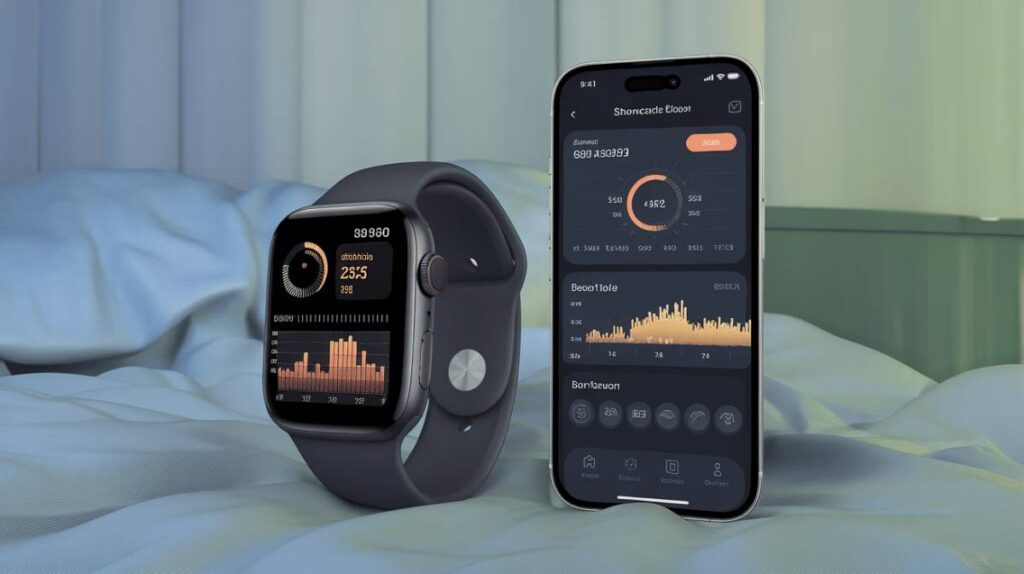
Technology and Sleep Improvement
We’ve all been there, tossing and turning when we should be counting sheep. Luckily, tech can lend a hand in helping you catch those elusive Zs. Today’s gadgets and gizmos can give a sneak peek into our sleep cycles and tweak our habits for the better.
Using Technology Wisely for Better Sleep
Let’s not get carried away with our devices. Here are some laid-back ways to use tech without turning into insomniac robots:
- Blue Light Management: The glare of screens isn’t just hard on your eyes; it messes with your melatonin—a nifty hormone that plays sleep DJ. So, slap on those blue light filters or flick it to “night mode” to keep your bedtime serenade going strong.
- Winding Down: You wouldn’t sprint before a nap, right? Turn off the electronics an hour before hitting the hay. Grab a book or try unwinding with some relaxation magic.
- Sleep Sounds and White Noise: Got noise-apps? Use them! Nature sounds or white noise can jazz up your sleep zone, helping you drift off into dreamy bliss.
Need more tricks for a cozy sleep space? Check out our top tips on How to Improve Sleep Quality.
Sleep-Tracking Devices and Apps
We all like a little nudge in the right direction, and these sleep gadgets are pros at that. These gizmos can snoop on sleep patterns and dish out the deets on your snooze fest:
| Metric | Description |
|---|---|
| Sleep Duration | Total sack time on the pillow |
| Sleep Stages | Spy on those deep, light, and REM adventures |
| Sleep Quality | Gives a thumbs up or down on your night’s rest |
| Wake-up Times | Tracks when and how often you wake up |
Strap one of these bad boys on, like a fitness tracker or smartwatch, and let them sync up with your phone. This combo serves up sleep reports with a slice of data pie. Noticing frequent wake-ups? Try a bit of stress-busting or fix that bedtime routine with ideas from our Sleep Hygiene Tips.
These handy hints can help morph your sleep into something refreshingly comforting. For more savvy ideas on tech’s role in sleep improvement, swing by our sleep tips page.
By tapping the secrets tech reveals, you can flip the switch on sleepless nights into serene slumber, waking up to a world that feels just a little brighter.
Time to Call in the Sleep Pros
Sometimes counting sheep just won’t cut it. When tossing, turning, and dark circles become part of your daily life, it might be time to call in the experts. Knowing when to wave the white flag and reach out for help can make all the difference.
Dial Up the Doc
When you’re battling nightly woes, dialing up your doctor is smart. Docs can dig into what’s messing with your Zzz’s, whether it’s that late-night TV marathon or something more serious like your meds or medical quirks. They might suggest ditching those afternoon espressos, sharing some nifty sleep hacks, or planning further testing.
| Warning Sign | What’s Going On |
|---|---|
| Sleep Slump Timeline | If you’re sleepless for a month, it’s time to check in. |
| The Struggle | If laying awake, waking often, or being tired all day sounds familiar, you’re not alone. |
| Health Check | Conditions like sleep apnea or restless legs may need more attention. |
Your doc might send you to a sleep guru. Getting to the bottom of any health hiccup can mean getting those sweet dreams back on track.
Sleep Testing and Tailored Treatments
Need a closer look? A sleep study like a polysomnography might just be your new best friend. These tests cover everything from your brain’s night dance moves to how well your lungs are pulling their weight.
| Sleep Sleuth | What’s Being Investigated |
|---|---|
| Polysomnography | Brain chatter, ticker tempo, and lungs in action |
| At-Home Apnea Kit | Breathing patterns and oxygen highs and lows |
If there’s trickier business at hand, specialists might toss around a few ideas:
- CBT-I (the ace up their sleeve): This program helps you kick those sleep-sabotaging thoughts and habits to the curb.
- Pills Palooza: Sometimes a little pharmaceutical hand-holding helps short-term, maybe longer.
- Snorkel Gear (okay, not exactly): For apnea sufferers, gadgets like CPAP blow a breeze, keeping your airways open and dreams flowing smoothly.
By leaning on pros like health docs and sleep scientists, bedtime can finally mean what it should—a chance to recharge and reclaim the dreamland. Curious about other ways to step up your sleep game? Check out our tips on boosting your sleep quality and natural tweaks for better sleep.
Main Tips Around the Article
- Set a consistent bedtime and wake-up time.
- Create a cool, dark, and quiet sleep environment.
- Avoid caffeine and heavy meals before bed.
- Incorporate stress management techniques like meditation and deep breathing.
- Use technology (e.g., sleep trackers) wisely to monitor sleep patterns.
- Consider natural sleep aids and consult your healthcare provider if needed.
Conclusion
Improving your sleep is more than just a nightly ritual—it’s the foundation for a healthier, more vibrant life. By understanding the serious consequences of sleep deprivation, from impaired memory and mood swings to long-term chronic health issues, you can appreciate the value of quality rest. This article offers a deep dive into practical tips for creating an ideal sleep environment, establishing consistent sleep routines, and incorporating stress-management strategies like mindfulness and CBT-I. From using technology wisely to exploring natural sleep aids and lifestyle tweaks, every suggestion is designed to empower you with actionable steps to transform your nights. Embrace these insights, and start prioritizing sleep to enjoy improved mental clarity, enhanced productivity, and overall well-being.
FAQs
What are the immediate effects of sleep deprivation?
Lack of sleep can lead to poor memory, difficulty focusing, mood swings, increased irritability, and reduced overall performance.
How can I create a sleep-friendly environment?
Optimize your bedroom by maintaining a cool temperature (60-67°F), using blackout curtains, reducing noise with white noise machines, and selecting a comfortable mattress and pillows.
What lifestyle tweaks help improve sleep quality?
Regular exercise, mindful eating, limiting caffeine and heavy meals before bed, and maintaining a consistent sleep schedule can significantly enhance sleep quality.
Resources
Final thoughts
Sleep is not a luxury—it’s a crucial pillar of your physical and mental well-being. From understanding the consequences of sleep deprivation to learning practical ways to create a sleep-friendly environment, this article outlines a comprehensive blueprint for better rest. By establishing consistent routines, embracing stress-management techniques, and using technology and natural remedies, you’re empowered to reclaim your nights and transform your days. The insights provided are designed to help you navigate challenges related to sleep, ensuring that each step you take leads to a healthier, more productive lifestyle. Prioritize quality sleep to unlock your full potential and enjoy the benefits of enhanced memory, improved mood, and overall well-being.
Recommended Products and Accessories
- Memory Foam Mattress Topper: Enhance comfort and support.
- Blackout Curtains: Improve sleep by blocking out disruptive light.
- White Noise Machine: Enjoy soothing sounds for undisturbed sleep.
- Aromatherapy Diffuser with Lavender Essential Oil: Create a calming atmosphere.
- Sleep Tracking Smartwatch: Monitor your sleep patterns effectively.

